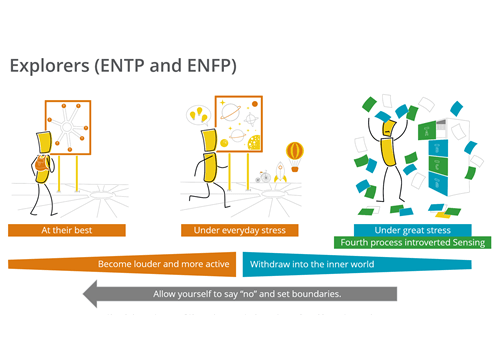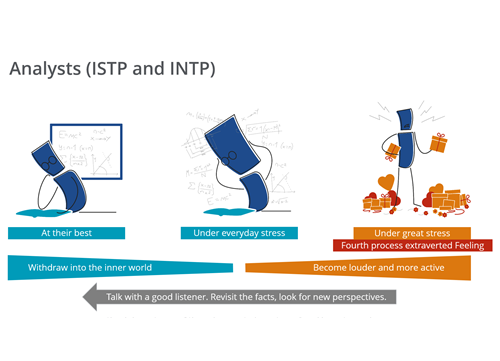Core Characters™ and severe stress
Use Type Dynamics to explore reactions to extreme pressure
Free-to-download resources to illustrate what happens to our personality when stress takes us to breaking point
When under pressure, we tend to fall back on, and start to over-use, the most comfortable and practised part of our personality – our leading Core Character (or dominant function). If the stress is extreme or goes on for too long, we exhaust the energy of our dominant function and our psyche flips into the opposite Core Character: our inferior function.
In Type Dynamics terms, we are caught in the grip of our inferior function, and are taken over by the least preferred and least practised part of our personality. Those who experience this process find it overwhelming, behaving and feeling very unlike themselves, and often feel embarrassed or remorseful afterwards.


Under extreme stress, our leading Core Character becomes overwhelmed by its directly opposite Core Character (inferior function). But in this stressed and opposite form, the fourth Core Character bears little resemblance to the way it operates when used as a favoured preference, shown by Inside-Outside Typies. The Core Characters in the grip have been created to illustrate this point for each of the eight Core Characters.
The following examples show the transition from normal high performance state to everyday stress exaggeration through to extreme stress reactions.
ENTP and ENFP Types share the leading Core Character of the Explorer. Under everyday stress, Explorers over-rely on their favoured Extraverted iNtuition, causing them to become frenetic and generate more ideas than they can process.
Under severe or prolonged stress, the Explorer can become overwhelmed by small details, obsessing irrationally about them. At this point, they are in the grip of Introverted Sensing, the Conserver Core Character – but in an immature, poorly practised and obsessive form, very unlike how this favourite Core Character appears for ISFJ and ISTJ Types. To recover from this state, Explorers may need to be encouraged to say ‘no’ and set boundaries. To decide what should be prioritised, they should consciously access their preferred decision-making function, Thinking or Feeling, to regain perspective.

In contrast, INTP and ISTP Types share the Analyst Core Character. Under everyday stress, they become over-reliant on thinking things through logically, seeking perfect solutions.
Under severe or prolonged stress, Analysts can succumb to the grip of Extraverted Feeling, the Nurturer Core Character. Again, this is very different from how this character is expressed when it is the core driver for ESFJ and ENFJ Types. An Analyst in the grip will lash out angrily at people, usually those closest to them, and especially when ‘provoked’ by someone trying to coax them out of deep solitary analysis. To recover from this state, Analysts may need to find themselves a good listener who can gently encourage them to revisit the facts and/or look for new perspectives on the situation – ie to access their preferred information-gathering function, Sensing or iNtuition, to regain perspective.

In summary, the most observable characteristic of each Core Character in the grip is that Extraverted Types become very quiet, and Introverted Types lash out angrily. Similarly, all Types under severe stress lose their usual balance between taking in information (Perceiving) and making decisions (Judging), remaining stuck in just one mode. To regain balance, both aspects of a person’s Type need to be addressed.
Download and use these PowerPoint slides to explore and provide tips for recognising and recovering from being in the grip of stress. As this resource is restricted to qualified MBTI practitioners, you will need to sign in or register for an account to gain access.